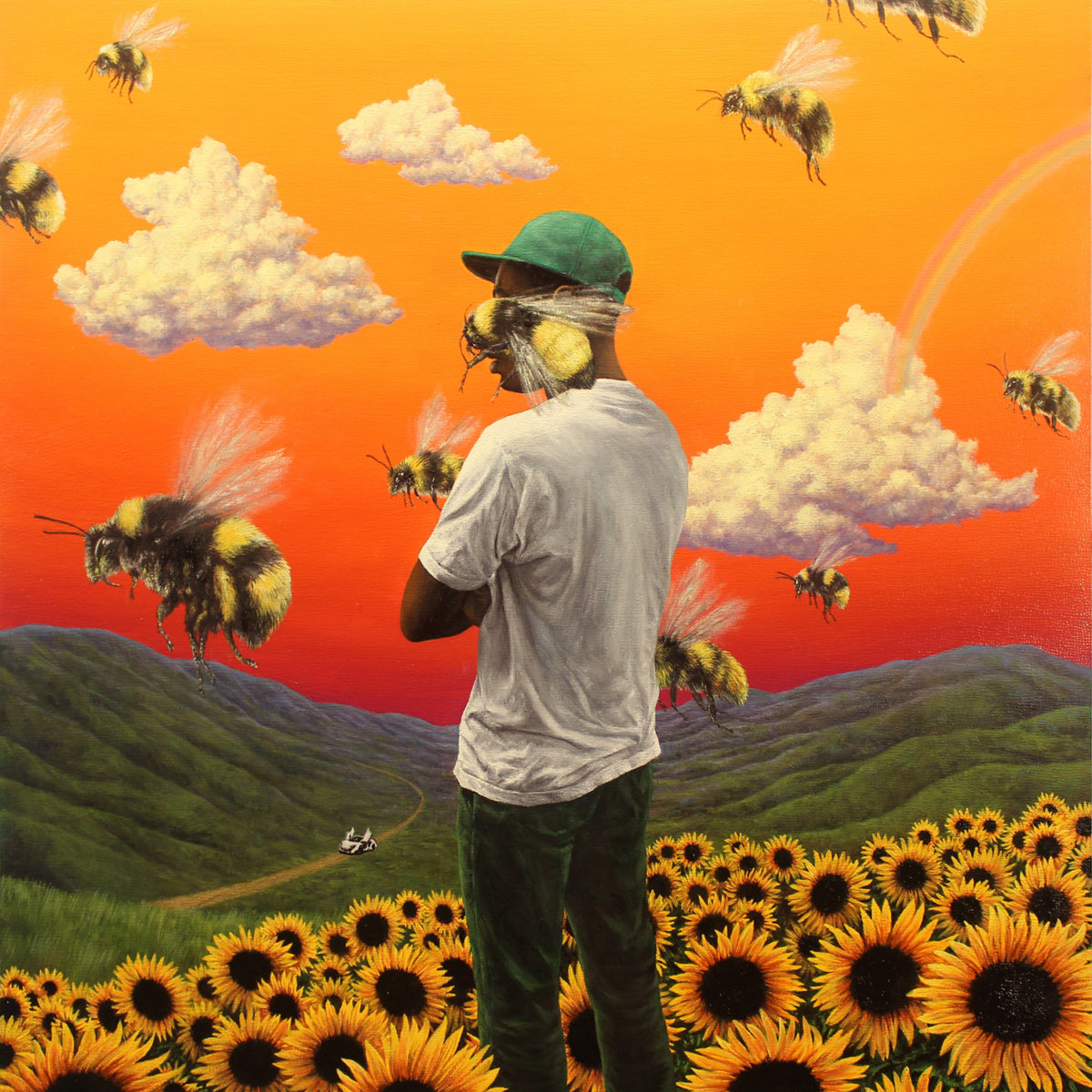This is the second article in a three-part series looking back on LGBTQ+ Pride Month. Queerness is a radical act, and it’s important to recognize queer artists who struggle not only against standard industry ferocity but also a queerphobic and abusive milieu. Please consider supporting these artists by directly purchasing their music during this pandemic.
#8: “Girl With Basket of Fruit” (2019) by Xiu Xiu
Xiu Xiu is led primarily by songwriter Jamie Stewart, an openly bisexual man who writes all kinds of music, from the violently noisy to the terrifyingly silent, with a deeply emotional, melodic sensibility underpinning it all. Demonstrating that dichotomy, Stewart ended the torrential 2019 album “Girl With Basket of Fruit” with a ballad titled “Normal Love.” In this duet, Oxbow frontman Eugene Robinson speaks about the moment when we “want to pretend/but cannot pretend,” his voice breaking as it rises over peaceful, simple keyboard chords and Angela Seo’s “oh”s and “ah”s. The song is about begging to be normal, begging to “run towards nothing,” and in Stewart’s infinite queer wisdom, he sings, “No, yes, yeah, no, yes, no, what? No/Normal love, normal love.”
The eight tracks that come before “Normal Love” on “Girl With Basket of Fruit” are terrifying noisescapes, rhythmic whiplashes of sound experiments, each of which makes it difficult to speak after listening. It’s a struggle to speak at all after this album, and nearly impossible to do so during the album’s 36-minute runtime. The only comfort I can give is that at the end, there is a beautiful and powerful respite, and suddenly the album, with all of its screeching and screaming, begins to make sense: This is what life looks like when you’re queer.
#7: “Come In” (2019) by Weatherday
“Come In” by the Swedish non-binary musician Weatherday came right when it needed to. For whatever reason, in April of 2019, as we were all thirsting for the next indie emo masterpiece to land on our porches, we got it in the form of a Bandcamp-distributed album by a then-unknown source. This album was, according to the liner notes, recorded via the hands-free mic on a pair of Bluetooth headphones. Anyone who listened was thrown into the whirlwind of distorted, compressed guitar noise, the cycling synth melody on top of the title opener “Come In” and the androgynous voice screaming out into the abyss, “sinking feeling, weatherday/I’ll be here, hope you stay/So come in!”
Throughout the album, numerous lyrical motifs recur, such as the aforementioned “weatherday” lyric (which repeats verbatim on the second to last track, “Агaтка”) and a scene where a character named Agatha draws a portrait of the protagonist. Throughout this musical storyline, it’s left mysterious what the term “weatherday” means, as well as what exactly Weatherday’s unique lyrical misspelling of the phrase “weather or not” signifies. In my mind, these lyrical moments provide fluidity, one of the key formal tics of the album, with the gender of the lyrical narrator constantly changing — paying homage to Weatherday’s background as a nonbinary person. These turns of phrase, alongside the powerful, daring usage of long melodic repetitions (such as in the 14-minute long track “My Sputnik Sweetheart”), make “Come In” incredibly powerful as a borderline novelistic experience, one that references itself and makes its meanings more clear as time goes on. At the end of “Porcelain Hands,” the final track, the opening melody of the album arrives once again right after the climactic vocals scream: “After all this waiting/I’m not some embarrassing painting!”
#6: “Flower Boy” (2017) by Tyler, the Creator

“I can only see your face when I close my eyes/Can I get a kiss and can you make it last forever?” The track “See You Again” from Tyler, the Creator’s album “Flower Boy” is a ubiquitous love song, one that feels ripe as any other queer moment of love despite Tyler’s previous homophobic remarks. It feels real as anything else because “Flower Boy” is as perfect as any other album on this list, its perfection coming from the low-key production quality and the resistance of squeaky-clean vocal styles in favor of soft invocations of the phrase “call me, call me, call me” on “911 / Mr. Lonely.” Its perfection comes from the way the sampling of belly-dancing music on “I Ain’t Got Time!” sits atop the thumping bass notes and the daring random noise at the beginning of “Who Dat Boy.” Its perfection comes from any of the rest of the beats, rapping and sounds on the album, especially the “duh-nu-nu-nu-nuh, duh-nu-nu-nu-nuh, duh-nu-nu-nu-nuh my baby” at the beginning of “Glitter.”
Everything about the album makes me wonder about the plaintive scene depicted on the album cover, where Tyler stands in a field of sunflowers surrounded by bumblebees. What comes to mind instantly is the phrase “boredom got a new best friend” from the album’s “Boredom,” and the way that song makes me remember lonely days — wondering if I was going to eat cereal that next morning or find some time to do something else. I wanted to find time to kiss someone else, or get desperate to find someone to hug, but all I could do was lay in bed ‘til the morning and try to grow tendrils, show some sort of growth in the first place. “Flower Boy” is about the beauty of being stuck, the graciousness of never knowing who you are in the first place. Queer or homophobic? We’ll know one day. “20/20 vision, cupid hit me with precision, wonder if you look both ways when you cross my mind,” Tyler sings on “See You Again.” We all have regrets, we all have desires. Maybe Tyler is singing about that desire we all have to be saved and to live faithfully for the rest of our days.
#5: “OIL OF EVERY PEARL’S UN-INSIDES” (2018) by SOPHIE
Writing this article after SOPHIE’s passing is bittersweet and terrifying — bittersweet because SOPHIE was the first figure in my life to assert that transness was not only good, or neutrally okay, but beautiful and worthy of celebration, and terrifying because it feels like nothing more can be said about queer music after SOPHIE’s death. When SOPHIE sang “It’s Okay to Cry,” the first track off of “OIL OF EVERY PEARL’S UN-INSIDES,” above soaring crushed electronic percussion, I cried. It was okay. With SOPHIE by my side, through the terror of coming out as trans/nonbinary, knowing there was someone out there who prefers not to use any pronouns at all, I felt alright. “Just know whatever hurts, it’s all mine.” I put my pain on SOPHIE’s music, and it felt alright because the song told me what to do.
“OIL OF EVERY PEARL’S UN-INSIDES,” SOPHIE’s debut Grammy-nominated album, is a 40-minute long experiment in metallic twangs of electronic production, its sounds created by direct and granular manipulation of sound waves to mimic bangs of kettle collisions and pure metal disruption. Owing greatly to SOPHIE’s experience DJ-ing in clubs, this is dance music for the untamed, footsteps and twirls for the pathologically deranged. This is what trans music looks like: beautiful and noisy and terrifying all at the same time. There are ambient experiments like “Is It Cold In The Water?” and there are large-scale anthems like “Immaterial.” The combination is intoxicating. Listen and take the plunge into an undersea adventure, clouds overhead, body twitching, ears ringing.
